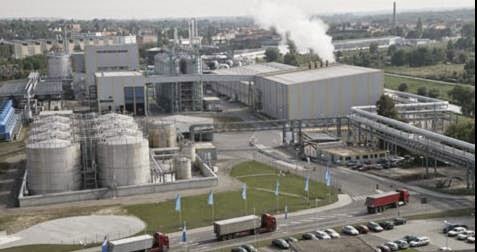Zeitz Bioethanol Plant
Nombre / Name
|
Zeitz Bioethanol Plant
|
Empresa / Company
|
CropEnergies Bioethanol GmbH (www.cropenergies.com/)
|
Localización / Location
|
Zeitz (Alemania / Germany)
|
Categoría / Category
|
Comercial / Commercial
|
Estado / Status
|
Operación / Running
|
Plataforma / Plataform
|
Almidón, azúcares / Starch, sugars
|
Materia prima / Feedstock
|
Remolacha azucarera, grano / Sugar
beet, grain
|
Producto / Product
|
Bioetanol, piensos y CO2 / Bioethanol,
animal feed y CO2
|
Puesta en marcha / Start-Up
|
2005
|
Figure 1.
Zeitz Bioethanol Plant (Extracted from Reference 1)
CropEnergies
Bioethanol GmbH opera en Zeitz una de las plantas de bioetanol más grandes de
Europa con una capacidad anual de 360.000 m3 que, además, produce piensos y
recupera el CO2 generado durante la etapa de fermentación. La planta se
localiza en el medio de una de las regiones con plantaciones de trigo más
grandes de Alemania y en la inmediata vecindad de una refinería de azúcar
operada por Südzucker AG (matriz de CropEnergies Bioethanol GmbH). La planta
también tiene muy buenas conexiones por ferrocarril y carretera. Una
característica muy importante de la instalación es su flexibilidad en lo que a
procesado de materias primas se refiere. Además de diferentes cereales, como
trigo, maíz o cebada, puede producir bioetanol a partir de productos
intermedios de la refinación de azúcar. In Zeitz, CropEnergies Bioethanol
GmbH operates one of the largest bioethanol plants in Europe, with an annual
capacity of 360,000 m³. In addition, it produces valuable animal feed products
and recovers the CO2 generated during the fermentation stage. The Zeitz plant
is located in the middle of one of Germany's largest wheat-growing regions and
is also in the immediate vicinity of one of the sugar factories operated by
Südzucker AG. So it is situated right where the raw materials required for
production are available. The plant also has very good rail and road links.
Another important characteristic of the plant in Zeitz is its ability to
continuously process a range of raw materials. Besides different cereals, such
as wheat, maize and barley, it can also produce bioethanol from intermediate
products from sugar production.
Figure 2. Schematic diagram of production process (extracted from
Reference 2)
Datos de producción / Production
data
|
|
Unidad de producción de bioetanol / Bioethanol
production unit
|
|
Input 1: Grano / Grain
|
600,000 ton/y
|
Input 2: Remolacha azucarera (jarabes
de azúcar) / Sugar beet (sugar syrups)
|
1,000,000 ton/y
|
Output 1: Bioetanol / Bioethanol
|
360,000 m3/y
|
Output 2: Piensos ricos en proteínas
/ Protein-rich animal feed
|
260,000 ton/y
|
Unidad de licuefacción de CO2
/ CO2 liquefaction unit
|
|
Output: CO2
|
100,000 ton/y
|
_________________________________________________________________________________
REFERENCIAS / REFERENCES:
3 IEA Bioenergy
Task 42 Biorefining. Sustainable and synergetic processing of biomass into
marketable food & feed ingredients, products (chemicals, materials) and
energy (fuels, power, heat). Wageningen,
the Netherlands, August 2014.





